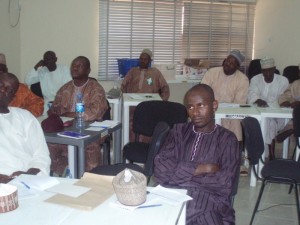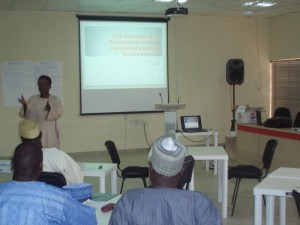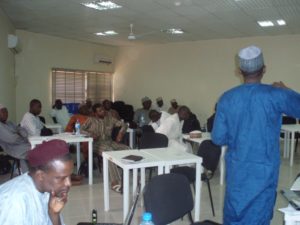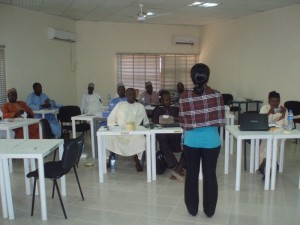WORKSHOP ON ICTS FOR LEGISLATIVE PURPOSES
WORKSHOP ON ICTS FOR LEGISLATIVE PURPOSES
Like in other spheres, ICTs are important in legislative work. tHis was why the Centre for Information Technology and Development (CITAD) and State Accountability and Voice Initiative (SAVI), Jigawa State Office  partnered to deliver workshop on ICTs in Legislative Work for support staff of the Jigawa State House of Assembly. The workshop held on 20th and 21st, March, 2013 at the seminar room of Manpower Development Centre, was attended by 20 staff of the House, mostly committee secretaries. The aim of the workshop was to expose them on the various uses of ICTs for legislative purposes and enhance their skills in these of some of the basic tools. In his opening remarks, the Director of CITAD said that the two organizations were committed to enhancing the work of the legislature and therefore thought that this was another angle for them to offer their contribution.
The first session of the work was a presentation on Understanding of ICTs by Mal Ahmad Yakasai, who took the participants through the various stages in the development of ICTs, their dimensions and ended with key observations about the problems of ICTs in the country. This was followed by Self-Learning the Computer: Strategies and Tips, facilitated by Engr Kamal Umar. The aim of this was to demystify the perception that learning computer was difficult. Engr Kamal show that people who were interested in learning the computer could do so without having to look for teacher he contended that each package comes with self-explanatory help menu form which people could get by. He demonstrated various self-learning skills from basic use of mouse to more complex skills in the use of work processing and other packages. Kamal followed this presentation with another on online tools and advanced Internet Applications. This were a series of various online tools that staff could use for storing their documents online, taking minutes, translating documents into various languages and even conducting interviews
The second day started with a presentation on the concept of e-Parliament/Virtual Parliament and its Requirements by Y. Z. Ya’u the participants were taken through the evolution of the application of ICTs in governance, leading to the emergence of e-Parliament/virtual parliament, which is the use of ICTs in all aspects of legislative work and processes. He identified the requirements for such, noting that much of these were already available. He ended his presentation by identified key challenges to the deployment of the virtual parliament in the state and discussed how these challenges could be overcome. The presentation also provided a short situation analysis of the Jigawa State House of Assembly with respect to availability of ICTs and its use. This session was followed by one on Social media in Legislative Work also facilitated by Y. Z. Ya’u. The session stated with a discussion what social media is, and what makes it social. This was followed by a survey of various types of social media tools. After the survey, the presentation focused on the three most widely used in the country namely Facebook, Twitter and TubeYou. The use of each of these for legislative work was discussed with illustrations and an analysis the suitability of each for specific purposes
Short session on audio-visual documents was facilitated by Sufyan Lawal Kabo who took the participants through the rudiments of both voice and video editing as well as these could store and retrieve for later use. There were also group work sessions in which participants were asked to propos appropriate ICT solutions to specific problems in legislative work.
The last session was facilitated by Ms. Toyin Gaba, the Knowledge Management and Communication Adviser of SAVI. She presented the results of the self-administered audit of the House with respect to ICTs. She shared the results, the implication and the effort being putting to address identified challenges and gaps.
The workshop was closed by n evaluation what the participants learned during the two day period. Participants expressed their appreciation to both CITAD and SAVI for the workshop and prayed for more such opportunities. In her closing remarks, SAVI Programmes Officer, Ms. Chikah Okho called the participants to make effective use of the knowledge and skills they had acquired.





Leave a Reply